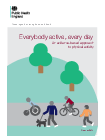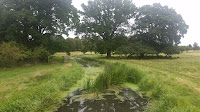 Things newly published...
Things newly published...The Lancet has just launched a new journal 'The Lancet Child & Adolescent Health' you can keep abreast of the articles by signing up for their email alerts or you can sign up for our Paediatric medicine e-prompt service which will include this journal along with others that we monitor. We have e-prompts on many specialist subjects and anyone can sign up to receive them.
Things about obesity...
The Department of Health has announced £5 million of funding for a new obesity policy research unit at University College London. One year on from the launch of the childhood obesity plan, the National Institute for Health Research (NIHR) Obesity Policy Research Unit has been set up to provide resource for long term research into childhood obesity. It will give independent advice to policy makers and analysts, and develop understanding on the causes of childhood obesity, looking at social inequalities, the early years of childhood, and marketing to children and families. It will also help to evaluate action that has been taken so far, to make sure the plan works for those who need it most. In addition, the government tasked Public Health England (PHE) to look at why children are eating too many calories.
Things about allergy growth and nutrition...
A letter in pediatric Allergy and Immunology discusses 'Striking the balance between primary prevention of allergic disease and optimal infant growth and nutrition. '
The timing of introduction of solids and/or complementary feeds continues to be an area of intense interest with respect to allergy prevention and general optimal infant nutrition. There is recent evidence from RCTs and a meta-analysis, that the earlier introduction of peanut (between 4 and 11 months) and egg (between 4 and 6 months), in infants at higher risk of allergic disease, may be beneficial. However, concerns have been raised over the impact this may have on duration of breastfeeding, nutrition and growth, when a high protein and calorie-containing food, such as egg or peanut, is introduced. Duration of breast feeding appears to have little impact on development of allergic disease, but is important for protection against overweight and obesity, diabetes and childhood infections (particularly in resource poor settings). Read the full letter here
Things about mental health...
 The Royal Colleges of GPs (RCGP), Paediatrics and Child Health (RCPCH), and Psychiatrists (RCPsych) have committed to five shared principles that they hope will lead to tangible actions to improve the care and support of children and young people (CYP) with mental health problems.
The Royal Colleges of GPs (RCGP), Paediatrics and Child Health (RCPCH), and Psychiatrists (RCPsych) have committed to five shared principles that they hope will lead to tangible actions to improve the care and support of children and young people (CYP) with mental health problems.Following the development of the joint principles, the three Colleges have committed to a number of ongoing actions. These include ensuring the highest quality training and standards in CYP mental health; supporting the development of evidence based models of care that are focused on integration of care; and calling for greater investment and resources to be focused on developing services in CYP friendly settings that promote early intervention and resilience.
Things about patient flow...
 Technology to track beds, equipment, staff and patients through a hospital has been used in the USA for years, with positive effect, and now there is growing interest in employing it in the NHS. Sophie Castle-Clarke (Nuffield Trust) joined a group of NHS leaders to look at how this technology has made a difference to flow and operational management in two different health care organisations in Florida. The results are impressive, although significant transformation is needed to realise the benefits.
Technology to track beds, equipment, staff and patients through a hospital has been used in the USA for years, with positive effect, and now there is growing interest in employing it in the NHS. Sophie Castle-Clarke (Nuffield Trust) joined a group of NHS leaders to look at how this technology has made a difference to flow and operational management in two different health care organisations in Florida. The results are impressive, although significant transformation is needed to realise the benefits.Things about tobacco...
 Several Member States in the WHO European Region are moving towards becoming tobacco-free: a smoking prevalence of 5% or less. Emphasis, in particular, is on protecting younger generations from smoking initiation and other tobacco-related harm. Protecting children from tobacco in the Region is essential, not only because smoking initiation is a key component of an important public health crisis, but also because Member States are responsible for supporting various children’s rights. This report highlights ongoing and emerging tobacco-related issues that affect children in the Region and examines the regulatory frameworks, commitments and other tools that Member States should use to protect children from tobacco. This also includes more novel approaches that could – and should – be used to pave the way towards a tobacco-free European Region.
Several Member States in the WHO European Region are moving towards becoming tobacco-free: a smoking prevalence of 5% or less. Emphasis, in particular, is on protecting younger generations from smoking initiation and other tobacco-related harm. Protecting children from tobacco in the Region is essential, not only because smoking initiation is a key component of an important public health crisis, but also because Member States are responsible for supporting various children’s rights. This report highlights ongoing and emerging tobacco-related issues that affect children in the Region and examines the regulatory frameworks, commitments and other tools that Member States should use to protect children from tobacco. This also includes more novel approaches that could – and should – be used to pave the way towards a tobacco-free European Region.
Things about brisk walking...
You will have heard in the news this week about the added health benefits of a 10 min brisk walk...this was an update in 'Everybody active, every day: a framework to embed physical activity into daily life' first published in 2014. You can read all the evidence and associated documents from links on this page
Things gluten-free...
 |
| (C) Gill Kaye 2017 |
 We had our annual big family reunion picnic last Sunday at the lovely Charlecote Park (equidistant between Tunbridge Wells, Marlborough, Grantham, Stafford and Sheffield...the relations who live in Warwick had the quickest journey!). As one of my food contributions I made a sun-dried tomato 'bread' which was much appreciated by everyone - not just those GF.
We had our annual big family reunion picnic last Sunday at the lovely Charlecote Park (equidistant between Tunbridge Wells, Marlborough, Grantham, Stafford and Sheffield...the relations who live in Warwick had the quickest journey!). As one of my food contributions I made a sun-dried tomato 'bread' which was much appreciated by everyone - not just those GF.
















